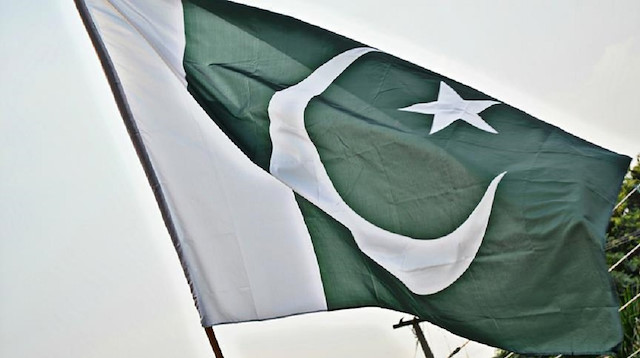
Head of Tablighi Jamaat Pakistan Haji Abdul Wahab passes away in northeastern Lahore city at age of 96
Haji Abdul Wahab, the ameer (chief) of Tablighi Jamaat Pakistan, passed away in northeastern Lahore city on Sunday at the age of 96.
He was buried on the same day in Raiwind -- the headquarters of Tablighi Jamaat -- in the eastern outskirt of Lahore in the presence of tens of thousands of his followers apart from politicians, parliamentarians and people from other walks of life.
He had long been suffering from different diseases, and his health further deteriorated by Dengue fever last week.
Born in 1922 in a devout family in New Delhi, Haji Abdul Wahab was the third ameer of Tablighi Jamaat in Pakistan after his predecessors Haji Shafi Qureshi, and Haji Bashir Ahmed.
He joined the Jamaat in 1944 when he met Maulana Mohammad Ilyas, the founder of Tablighi Jamaat, one of the world's largest religious movements.
Hailing from a warrior Rajput tribe, Haji Abdul Wahab, migrated to Pakistan in 1948, a year after partition of united India following the end of British colonial rule.
His family settled in Vehari district of northeastern Punjab province, and later moved to nearby Jhang district for a brief stay.
He graduated from Islamia College Lahore and joined the Punjab Revenue Department but resigned after a few years and completely devoted his life for the mission of his Jamaat.
For a brief period, he also remained with Majlis-e-Ahrar -- an anti-colonial political party -- and also participated in anti-Qadiyani movement in early 1950s in Pakistan.
However, Tablighi Jamaat had been the center of attraction for him since 1944. He was appointed as the third ameer of the Jamaat in 1992 by the central Shura (consultative body) .
Regarded as a soft-spoken preacher, who avoided touching controversial topics, Haji Abdul Wahab was one of the key figures behind expansion of Tablighi Jamaat in Pakistan.
So much so, the Jamaat leaders were used to be invited to the Cabinet meetings to guide the ministers on Islamic issues till late 1990s.
He was ranked 10 in the list of 500 most influential Muslim figures in the world in 2014.
He hit the headlines in 2013 when Pakistan Taliban proposed his name as a negotiator for peace talks between them and the government. However, he refused to become part of any controversy.
Founded in 1926 in northwest India by Maulana Mohamma Ilyas, Tablighi Jamaat is a global Islamic missionary movement that focuses on imparting basic Islamic teachings to the common Muslims along the lines of the teaching system introduced by Ashab-e-Suffa (Companions of Prophet Mohammed) in early years of Islam.
The creation of Tablighi Jamaat is said to be the reaction to a movement of reconverting Muslims and Christians by some Hindu nationalist groups in united India.
Initially, Maulana Ilyas had established schools across India along the lines of convents to teach Muslims basic Islamic education in order to counter the Hindu nationalists' move.
But with the passage of time and expansion of its influence, the Jamaat changed its style and started preaching common Muslims in mosques, markets and even visit their homes.
Its members usually do not get involved in scholarly debates. Instead they focus on their famous six points, which include Kalima (Belief in Allah and finality of Prophet Muhammad), Salah (daily prayers), Ilm and Dhikr (gaining knowledge and remembering Allah), Ikramul Muslimin (Honoring fellow Muslims), Ikhlas (sincerity towards Allah) and Dawah (preaching the message of Allah).
The Jamaat send its members on short and long missionary tours spanning from a few days to several months across Pakistan and abroad.
Though, Jamaat officially does not associate itself with any particular sect. However, over 99 percent of its followers belong to Deoband school of thought from Hanafi sect.
With its international headquarters in three South Asian nations -- India, Pakistan and Bangladesh -- the Jamaat has its presence in at least 150 countries.
Millions of people attended its annual congregations in India, Pakistan and Bangladesh.
Some criticize the Jamaat's loose internal structure as a possible hideout for militants who could take advantage of that. However, Jamaat officials reject the notion and insist that they have already tightened the process of joining the Jamaat.
No one can now join the Jamaat without having required identification documents and certification from local Jamaat officials, they say.
Maulana Nazar-ur-Rehman, a veteran preacher who led the funeral prayer of Haji Abdul Wahab in accordance to the latter's will, is being tipped as the fourth Ameer of the Tablighi Jamaat.
Currently, he is serving as the Jamaat's deputy chief.
Another strong candidate for the post is Maulana Mohammad Zubair who too holds a senior position and high esteem in Jamaat.
Renowned religious scholar Maulana Tariq Jameel who is famous for his mesmerizing speeches, may turn out to be a dark horse. But many see his "prominence" as a disadvantage for him as Jamaat leaders do not want him being in the limelight.
By and large, the Jamaat leaders and followers stay away from the media. Many of them even do not like to be pictured unnecessarily.







